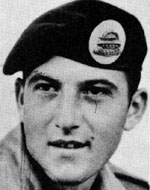Markosheimer, Eliezer (“Marcus”)
Son of Moshe and Ethel. He was born on July 21, 1940 in Mexico City, Mexico. Eliezer attended elementary school and in the Jewish school in Mexico City. He then studied and graduated from the Madrid Gymnasium. Finally he studied for three years at the Faculty of Law of the National University of Mexico. He loved sports and was very active in Maccabi. He headed the Hashomer Hatzair movement in that country. In 1961, Eliezer immigrated to Israel. In Eliezer, the characteristics of a man of spirit and a man of action merged. Just as he stood out among his friends abroad in various areas of art, he also stood out in Israel. At the theater, he stood out as a player and tended to direction in which he paid. He wrote poetry, written in Spanish, in which he discovered a young poet with a spirit of spirit, who wondered at the beauty of the world and its ugliness, which constituted a dilemma for him whose solution did not arrive. The songs are about topics such as peace and war, love and death, racial discrimination, and they express his personality and spirit and his other lofty qualities. Was a participant in music circles. Painting was also drawn, and in this area there were a number of drawings in black and white as well as several paintings. He also participated in philosophy circles. Everyone who came into contact liked and respected him for his integrity, his intention, his education and his societal approach. In May 1962, a few months after his arrival in Israel, he volunteered for the IDF, but at first he had no intention of remaining in the ranks of the army and he also declared to many that he did not care for the army because he loved peace and was an avowed pacifist. When he was asked to choose one of the soldiers, he chose the Armored Corps because he loved the sound of the word without understanding what it meant, for he did not understand the Hebrew language and he barely spoke it during his service, from basic training until his release with the rank of officer. He completed all the courses cum laude and finished them as an outstanding trainee even though in the first year he spoke Hebrew with difficulty After completing his regular service, he spent another three months in the career army, then worked for the Foreign Ministry and, as in the army, was praised for his work, and after his marriage began working as a printing house belonging to his father-wife. And on the third day of his battles, he was killed in a battle that took place in Jabel-Livni during the Yom Kippur War, when he was hit by a purge The route from Jabel Livni to Abu-Agila – and he was then the head of his men. Put a wife and daughter who was not yet six months old in the fall of her father; He was laid to rest at the military emergency cemetery in Bari and was later transferred to the eternal rest of the military cemetery on Mount Herzl in Jerusalem. His name was immortalized in the pamphlet “The Centurions,” the battalion in which he served.
